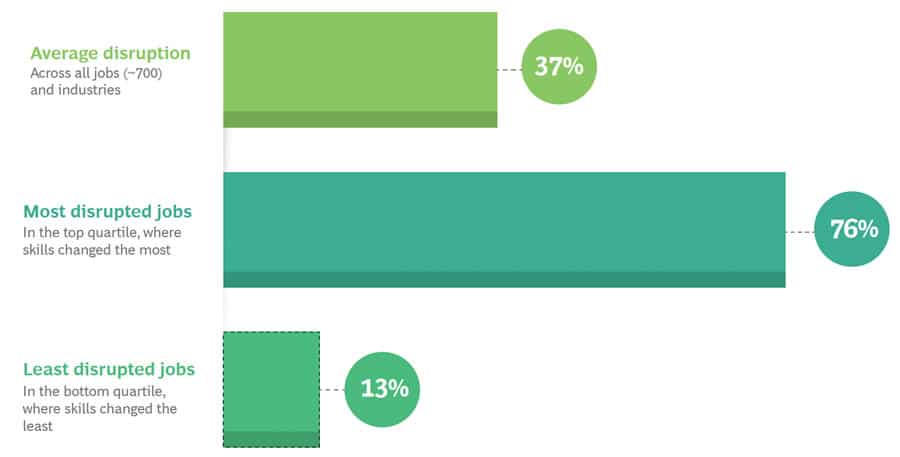Are more US employers shifting away from degree requirements?
- New research on US labour market trends points to some important shifts in the skills required by employers across the economy
- The findings also point to widespread easing of degree requirements in many employment postings
"Jobs do not require four-year college degrees. Employers do," says a recent report from The Burning Glass Institute, a US-based research centre focused on "the future of work and of workers."
Burning Glass has produced two reports on the subject this year, and they both point to an important reset in the labour market with respect to degree requirements. It should be said that both studies are concerned specifically with labour demand in the US, but each relies on large-scale analysis of millions of job postings and they echo trends that we can see in other developed economies as well.
At a high level, the Burning Glass findings point to some material shifts in the types of skills and qualifications that are most in demand by employers, and it is easy to imagine some wide-ranging implications for educators at all levels.
First, the type of skills that are in demand is changing across the economy. "Overall, 37% of the top 20 skills requested for the average US job have changed since 2016. (We assume the same trend is valid across the developed world.) One in five skills (22%) is entirely new. And certain sectors – finance; design, media, and writing; business management and operations; HR; IT – have changed faster than others…In reviewing the five-year data, we detected an acceleration in the pace of change. Nearly three-quarters of jobs changed more from 2019 through 2021 (during which time the compound annual growth rate was 22%) than they did from 2016 through 2018 (19%). We attribute this increase during our review period to the pandemic, which forced businesses to rethink operations and people in all kinds of occupations to embrace new ways of working and new skills."

The institute maps important trends in changing skills required throughout the report, especially with respect to digital skills that are now required in non-digital occupations, soft skills, visual communication, and social media skills. Overall, the findings point to an increasing emphasis on the use of technology, even in fields that are not technology focused, and key interpersonal and communication skills, including problem solving, teamwork, collaboration, and creativity.
Connected to this changing skills landscape is another key trend identified earlier this year by another large-scale analysis of US employment postings: many employers are dropping degree requirements, and especially so over the last two years. "Employers are resetting degree requirements in a wide range of roles, dropping the requirement for a bachelor’s degree in many middle-skill and even some higher-skill roles," says the Institute. "This reverses a trend toward degree inflation in job postings going back to the Great Recession. And while the COVID-19 pandemic accelerated this process, this reset began before the crisis and is likely to continue after it."
More specifically, Burning Glass's analysis found that near half (46%) of middle-skill and 31% of high-skill occupations saw changes in degree requirements between 2017 and 2019. This pattern accelerated during the pandemic, and – both before and after COVID – an easing of degree requirements has been accompanied by a corresponding increase in how specific employers are about the types of soft skills they require, including writing, communication, and problem solving.
The report adds, "This reset could have major implications for how employers find talent and open up opportunities for the two-thirds of Americans without a college education. Based on these trends, we project that an additional 1.4 million jobs could open to workers without college degrees over the next five years."
Aside from those two important shifts – the changing skills landscape and the easing of degree requirements – the overall picture you get from the two reports is of a greater emphasis in the US on skills-based hiring. That is, a greater weight given to the skills that candidates have as opposed to their academic qualifications.
This has been driven in part by an underlying labour market dynamic -- in short, there is not enough labour or talent to meet employer demand and so employers are responding in part by easing hiring requirements. But it also reflects the fast-paced nature of technological change across the economy. "The accelerating rate of technological change is reshaping skills requirements faster than providers can respond," says the report. "That further worsens the shortage of skilled talent with or without a degree – especially in jobs based on digital technologies. Evaluating applicants on their demonstrated skills and aptitudes, rather than on their level of academic attainment, can simultaneously help companies address skills shortages while creating more opportunities for [candidates] aspiring to improve their employment circumstances."
There are important market signals in these findings for candidates, employers, and educators alike. For example, college-aged students may be more encouraged to explore non-degree post-secondary options. And educators may be just as encouraged to give a greater weight to the development of so-called "soft skills" in their curricula, especially with respect to communication, creativity, collaboration, and problem solving.
For additional background, please see:















